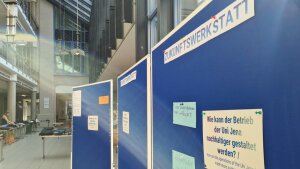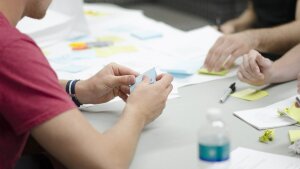
The Zukunftswerkstatt (future oriented workshop) encourages new ideas to accelerate the transformation to a sustainable university. Sustainability means taking the needs of future generations into account when taking action. Therefore, the Zukunftswerkstatt relies on the cooperation of all university members. Students contribute creativity and innovative ideas through their involvement. At the same time, the experience of university administration employees in internal university processes is needed to ensure that the goals can actually be implemented in the end. Academics also have professional expertise or best practice examples from other institutions that they can contribute.
Wall of Ideas for the Zukunftswerkstatt
Image: Sabrina StanglPhase 1: University-wide collection of ideas
In May 2022, pinboards at various university locations and a digital idea wall were used to collect points of criticism and suggestions for improvement on the topic of sustainability at the university. As a major kick-off for the Zukunftswerkstatt (future oriented workshop), a university-public World Café was held on May 31, 2022. A format in which participants were able to discuss further ideas for the institutional anchoring of sustainable trade in small groups in several rounds on concrete questions. All university members were invited to participate. The results formed the basis for the subsequent meetings of the working groups to develop the sustainability strategy for Friedrich Schiller University Jena.
placeholder image — Stylized representation of a film projector
Graphic: FreepikCollection of ideas in a group
Image: pixabayPhase 2: Working groups
The ideas and suggestions from the World Café and the digital participations were collected and processed by the Green Office. The working groups then met three to four times during the summer to discuss these ideas and formulate goals. In total, more than 120 university employees got involved in the working groups. Some of the work took place digitally via a cloud. The jointly agreed goals were also reviewed by the responsible departments at the university in terms of their social sustainability.
The Green Office took over the adaptation of the resulting drafts in terms of content and form and reconciled them with the working group members in feedback loops. In February 2023, the complete document was presented to the Executive Board. For some measures, organizational issues still need to be clarified, such as where the tasks are to be located or how infrastructure measures are to be financed.
Phase 3: Resolution
On December 12, 2023, the Senate recommended the adoption of the strategy. The decision by the Executive Board followed on December 19, 2023. Here you can find the current version of the Sustainability Strategy.
Phase 4: Implementation of the goals
The work is not over - having started in the winter semester 23/24, the strategy is currently in the process of implementation to ensure that the jointly established goals become reality as quickly as possible.

